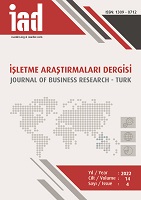Siyasal Pazarlamada Sosyal Medya Kullanımı: Ankara Büyükşehir Belediye Başkanlığı Seçimlerinde Twitter Söylemlerinin Karşılaştırması
The Use of Social Media in Political Marketing: A Comparison of Twitter Discourses in Ankara Metropolitan Municipality Elections
Author(s): Hacer Akın, Cemalettin AktepeSubject(s): Media studies, Political economy, Politics and communication, Politics and society, Marketing / Advertising
Published by: İşletme Araştırmaları Dergisi
Keywords: Political Marketing; Social Media; Municipality elections;
Summary/Abstract: Purpose - In this research, the connection between the use of Twitter and the election results is examined by taking data from the posts made by the candidates on their social media (Twitter) accounts during the 2019 Ankara Metropolitan Municipality elections. Design/methodology/approach – Content analysis was used as a research method in this study. In this direction, in the 2019 Ankara Metropolitan Municipality elections, the shares of the Nation Alliance candidate Mansur Yavaş and the People's Alliance candidateMehmet Özhaseki's Twitter accounts between 3-30 March 20129 were collected as data, and a total of 322 text-based tweets and 295 images were collected in 20 categories over the Maxqda 2020 program. It was analyzed qualitatively by making 1010 coding. On the other hand, the information about the number of followers, the number of accounts they follow, and the sharing times of the candidates were obtained from the social media measurement and analysis platform called “Boomsocial”. Findings - As a result of the research, it has been determined that both candidates evaluate the possibilities of social media as limited, and they make good use of one-way communication opportunities (creating content), but they rarely apply to options such as mention, reply, citation ... based on mutual interaction. On the other hand, it has been revealed that Mehmet Özhaseki uses the echnical possibilities of Twitter more than Mansur Yavaş. In this direction, it has been revealed that the effective use of social media does not have an effect on the election process alone. Discussion: Since the social media opportunity brought by digitalization has not yet reached a level of maturity that we cannot observe in Turkish conditions, social media studies for the Turkish samples fall short of giving an idea to the researcher and the reader on the course of the election, regardless of its scope. On the other hand, as a result of the findings obtained from the data of the candidates, it would be appropriate to say that the use of social media alone does not affect the election success.
Journal: İşletme Araştırmaları Dergisi
- Issue Year: 14/2022
- Issue No: 4
- Page Range: 3356-3375
- Page Count: 20
- Language: Turkish

